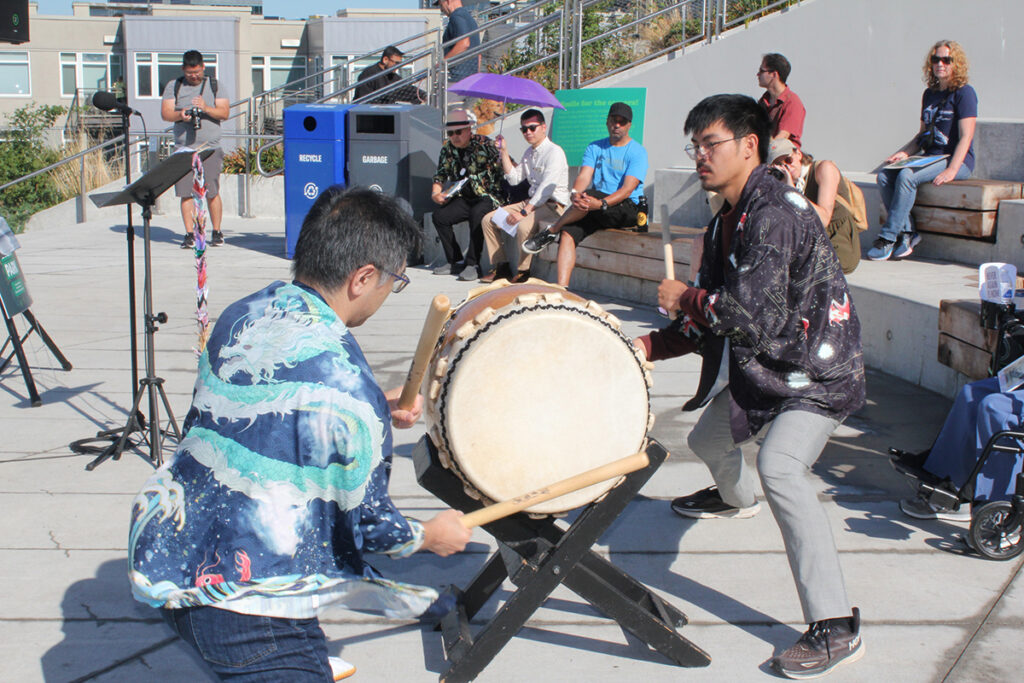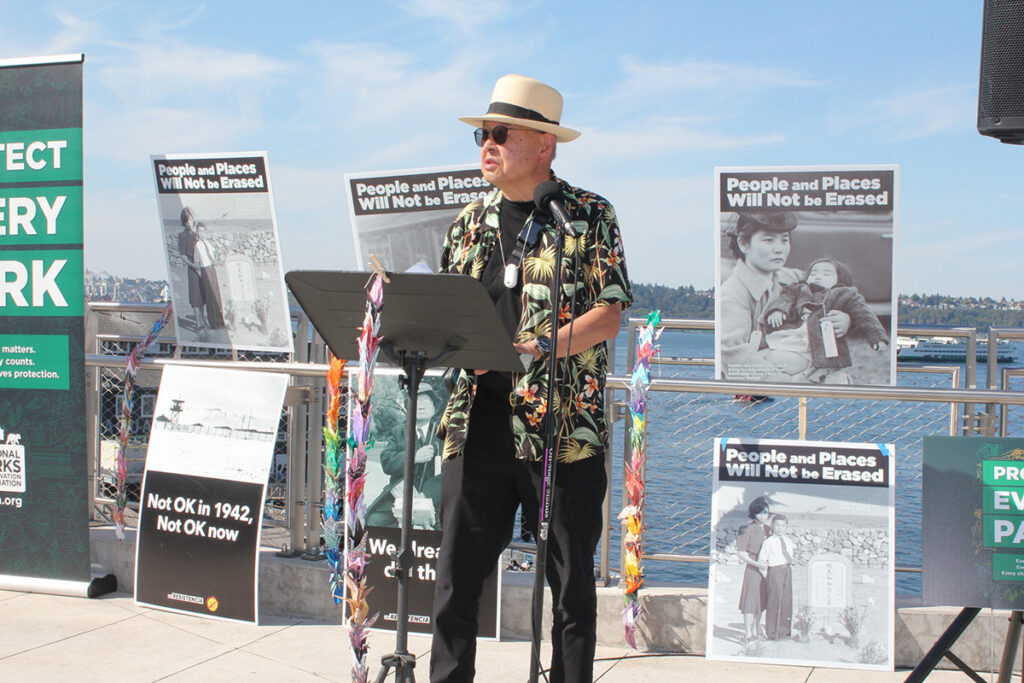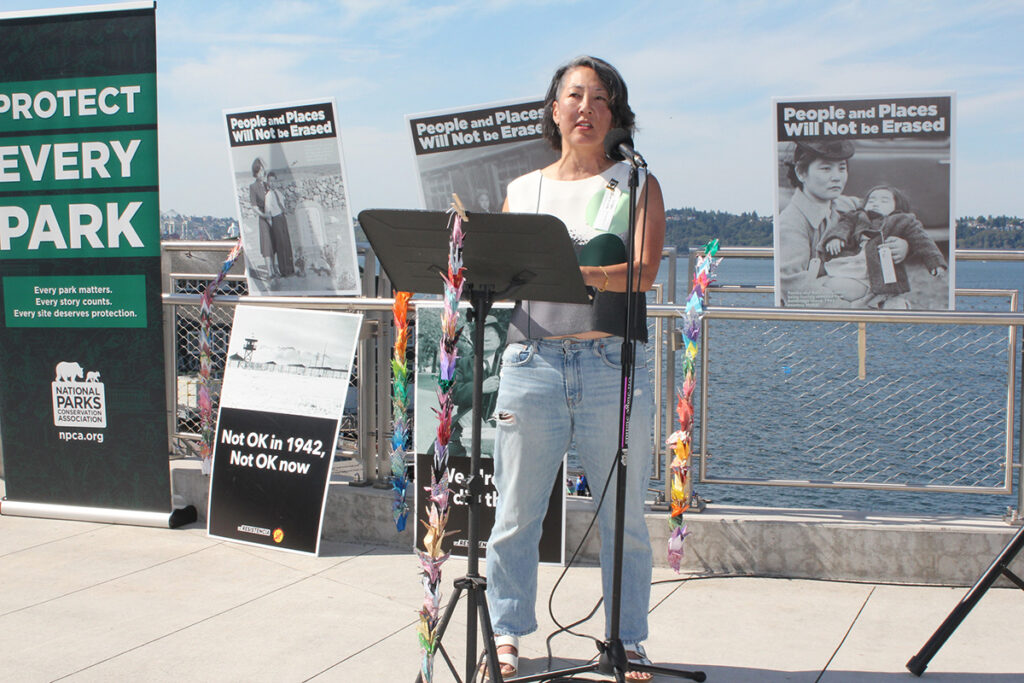By James Tabafunda
NORTHWEST ASIAN WEEKLY
Descendants of Japanese Americans incarcerated during World War II joined community leaders, advocates, and supporters in downtown Seattle on Aug. 23 to call for stronger protection of the nation’s parks during a nationwide day of action organized by the National Parks Conservation Association (NPCA).

Seattle Kokon Taiko performed before the start of Day of Action by the National Parks Conservation Association.
Echoing across Waterfront Park, the pounding rhythms of Seattle Kokon Taiko set the tone as speakers invoked urgency and intensity. Drummers in colorful robes struck large, barrel-shaped drums, their performance underscoring the call for Congress to immediately preserve public lands and drawing cheers from a crowd that held up signs that read “NO ERASURE, Protect Our Parks, Protect Our History” and “NEVER AGAIN IS NOW.”
The “Protect Every Park Gathering – Solidarity with Japanese American Incarceration Sites” was among dozens of events held around the nation. Organizers said the effort brings attention to recent funding cuts facing national park sites.
With more than 430 federally protected national parks—from Yosemite to Manzanar—the National Park Service manages not just landscapes but also places that carry the nation’s collective memory. Proposed cuts exceeding $1 billion would be the deepest in the agency’s history, threatening staff, programming, and upkeep at sites where visitors can learn stories of war, incarceration, immigration, and the civil rights struggle.

About 50 people attended the Day of Action by the National Parks Conservation Association.
Graham Taylor, NPCA senior program manager for the Northwest region, opened the rally before more than 50 people with an update of staffing cuts.
“Nearly 25% of national park staff jobs have been lost since January,” he said. “They’ve cut a quarter of their workforce. The wind is blowing them away. The wind of the Trump administration. The House passed legislation to cut $176 million from the National Park Service budget, and suggested dumping national park management onto the states. You might have heard that Washington has a $1 billion budget shortfall.”
“We’re here to tell them that history will not be rewritten,” he added.
For Japanese Americans, the stakes extend beyond park maintenance to the nation’s multiethnic history. The National Park Service oversees several of the incarceration sites where more than 120,000 people of Japanese descent were forcibly confined during World War II under Executive Order 9066.
Bainbridge Island, the first community uprooted from its homes, remains as a focal point for families in the Northwest who endured the loss of property, freedom, and dignity. Those sites—Manzanar, Tule Lake, Minidoka—now stand as preserved evidence of government mistakes and the fight for civil rights. Community leaders warn that proposed budget cuts jeopardize not only staffing and interpretation, but also decades of hard-won gains.

Poet and Minidoka incarceration camp survivor Larry Matsuda
Poet and Minidoka incarceration camp survivor Larry Matsuda was the rally’s first speaker. His words weaved a powerful testimony of lived experience and deep concern about repeating history. Central to his remarks is his identity: “I was born in the Minidoka, Idaho concentration camp during World War II,” a direct echo of the legacy of incarceration suffered by his family and the greater Seattle Japanese American community. Matsuda underscores the causes identified by U.S. presidents—race prejudice, failed leadership, and wartime hysteria—then connects those same dynamics to present-day realities: the rise of anti-Asian hate crimes, an overflow of misinformation, and inadequate leadership.
He warns, “The causes of the forced incarceration are still alive and well today,” linking the historic trauma with contemporary threats such as vandalism of Japanese American landmarks and the erasure of memory through institutional neglect. Matsuda’s poem “Legacy” added an insightful, generational perspective, expressing solidarity with those targeted by hate and vowing not to “turn [his] back in silence.” His words make clear that Japanese American advocacy in Seattle is not just about remembrance, but a commitment to resisting erasure and preventing another betrayal of American ideals and shared values.
National park sites tied to Japanese American incarceration highlight the power of public lands to confront difficult chapters of U.S. history. On Bainbridge Island, where the first families were forced from their homes in 1942, the Japanese American Exclusion Memorial underscores both the trauma of removal and the rare example of neighbors who resisted mass internment by supporting their friends. The site is now preserved as a satellite unit of the Minidoka National Historic Site, created after persistent community advocacy.

Bainbridge Island city councilmember Clarence Moriwaki
Clarence Moriwaki, a Bainbridge Island city councilmember, said the country is experiencing “revisionist history.” “It is happening again, and it’s really heartbreaking to see that happen, and I call them now domestic deportations,” he said.
Those concentration camps were “basically just large sheds that families had to live in, tar paper on the outside, and that’s it,” Moriwaki said. “I didn’t think things could get possibly worse. Boy, was I wrong.”
He used the phrase “Alligator Alcatraz” to describe U.S. immigration detention facilities, referring specifically to a detention site in the Florida Everglades that supporters say has a natural security barrier made up of alligators and other wildlife. “How is it possible to be worse than Minidoka or Manzanar there?” he asked.
“There are animals in ASPCA (American Society for the Prevention of Cruelty to Animals) that are being treated better. They’re behind bars, behind these cyclone fence walls and a cage and bunk beds stacked up inside of a tent. The ASPCA would come in and shut that down,” he said.
“With revisionist history being implemented as policy in our national parks, it’s now more important than ever to stand up for truth to power, to preserve stories over censorship, and to honestly tell both the great and shameful events of our nation’s past. Only by doing this will our national parks remain America’s best idea.”
Huy Pham, executive director of Asian & Pacific Islander Americans in Historic Preservation, stressed the crucial role of sites including Idaho’s Minidoka National Historic Site, the Bainbridge Island Japanese American Exclusion Memorial, the Wing Luke Museum, and Seattle’s Chinatown-International District in preserving the nation’s diverse history. Pham said these locations, along with the state’s Filipino American community halls and Seattle’s Panama Hotel, collectively exist with stories of injustice, resilience, and innovation—honoring Asian American and Pacific Islander communities’ constant struggle for equality and dignity.
He called the National Park Service and its public servants essential guardians of America’s diverse heritage, urging that their work remains adequately funded as the nation approaches its 250th anniversary. He criticized current proposals to cut the Park Service’s budget in favor of expanding immigration enforcement, arguing that full funding ensures preservation of parks and democracy itself. Pham urged the public to contact lawmakers, protect park staff, and defend every historic site, affirming that these places tell the true American story.

Rep. Sharon Tomiko Santos, state representative for Washington’s 37th Legislative District, Position 1
State Rep. Sharon Tomiko Santos began by reminding everyone that her district is “the most diverse legislative district in the state of Washington, where more than one in every four persons was born in another country.” Central to her remarks is her identity as the granddaughter of Japanese Americans who were incarcerated during World War II.
“I am standing here to say, ‘We hereby refuse to permit my family’s history to be erased,’” she said. “We are facing a literal whitewashing of American history. And I just want to say, both as an historian and as an elected official, and perhaps most of all, as an American, I am ashamed. I am ashamed of what I am watching take place on the literal eve of the 250th anniversary of the birth of this nation, a nation that was birthed on lofty principles, on the idea of freedom, on the idea of religious and other liberties, on the idea of the individual.”

Erin Shigaki, an artist representing Tsuru for Solidarity and the Minidoka Pilgrimage Planning Committee
Erin Shigaki, an artist representing Tsuru for Solidarity and the Minidoka Pilgrimage Planning Committee, shared her hope for the future. She called for purposeful action and collective healing during the nationwide day of action, urging Americans to stand against ongoing cycles of state violence and historical erasure. As co-chair of the Minidoka Pilgrimage Planning Committee and a member of Tsuru for Solidarity, Shigaki drew connections between her own family’s incarceration at Minidoka and current struggles facing migrants and families impacted by detention. She said, “The only way to break the United States government’s repeating supremacist actions is to heal, to hold, and to fight for both ourselves and for others,” highlighting the importance of supporting marginalized communities.
She encouraged participants to engage directly—by signing postcards to lawmakers, raising awareness on social media, and supporting local campaigns like the call to shut down Tacoma’s Northwest Detention Center. She emphasized mutual care: “Be bold, stay engaged and enraged and brave, and take care of yourselves and take care of each other and show up to heal, to hold, and to fight.”
Shigaki ended the event by leading the crowd with chants of “Protect every park,” followed by “Parks. Not Prisons.”
For more information on NPCA’s Day of Action, go to www.npca.org/campaigns/day-of-action.



